
Through its representation, advocacy and education functions, the Case Management Society of America (CMSA) has been an organizing force setting the practice direction for the discipline of case management. CMSA promotes practice that is evidence based and discourages the use of practices which, though popular or widely accepted, are either not beneficial or are contrary to the CMSA Standards of Practice for Case Management (SoP). While the increasing emphasis on care coordination by providers and payers has opened professional debate regarding the models being used in hospitals today, CMSA intends to clarify its position on hospital case management practice through this white paper initiative and urges hospital leaders to seek solutions that more effectively address the needs of our most vulnerable hospitalized patients.
This white paper has been in the works for almost two years through the work of a CMSA task force. The accumulation of their work is ready to share!
This white paper is FREE to Members.
Non-Members may purchase for $50.00
|
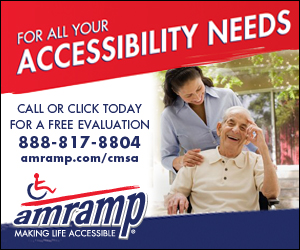
 We had a fantastic week in Las Vegas at CMSA Annual, bringing together professional case managers from across the care continuum and world! Thank you to all of our attendees, exhibitors, sponsors and leadership who made the week such a big success. We had a fantastic week in Las Vegas at CMSA Annual, bringing together professional case managers from across the care continuum and world! Thank you to all of our attendees, exhibitors, sponsors and leadership who made the week such a big success.
Already thinking about next year? We are, too! Save the date for CMSA's 30th Annual Conference & Expo in Boston, June 28 - July 3, 2020. Look for additional upcoming updates this summer on the call for presentations, accommodations and registration.
|
 CMSA Members: We invite you to complete a quick survey about the value of your CMSA membership. The survey should take you less than five minutes and can be accessed by clicking on the link below.
We recognize that the strength of CMSA lies without a doubt in its members. We also acknowledge that to retain and grow our CMSA membership, we must offer benefits that members, like yourself, will find important and necessary for the advancement of case management, the healthcare industry and especially the role of the professional case manager. By understanding what our members expect from CMSA, we are able to meet your expectations. As a result, we are also best suited to support your professional growth and advancement, retain you as a member and continue to grow together in our size and impact on the healthcare industry.
We are confident you will give this invitation special attention. We thank you for taking the time to complete the survey and share with us your view of how we can serve you better.
Sincerely,
Hussein M. Tahan, PhD, RN, FAAN - Chair of the CMSA National Membership Committee
Nikki Jackson MBA, Director of Member and Chapter Services
Members of the CMSA National Membership Committee
|
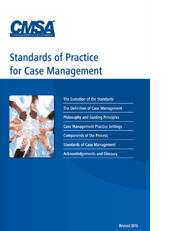
Download CMSA's Standards of Practice for Case Management, 2016 revision, which provides practice guidelines for the case management industry and its diverse stakeholders. The impetus for the 2016 revision of the Standards is the need to emphasize the professional nature of the practice and role of the case manager.
The 2016 Standards contain information about case management including an updated definition, practice settings, roles and responsibilities, case management process, philosophy and guiding principles, as well as the standards and how they are demonstrated.
Download Your Copy
|
 CMSA is pleased to announce a partnership with Bruce Berger, PhD, of Berger Consulting, LLC to bring you comMIt: Comprehensive Motivational Interviewing Training for Health Care Professionals at a discounted price. This 8-hour online program is centered around motivational interviewing, which is an evidence-based effective method for improving adherence to health behaviors. It was developed specifically for patients who are either ambivalent or resistant to change regarding these health behaviors.
CMSA has really listened to your requests for a practical motivational interviewing course targeted at healthcare professionals and their needs. We are thrilled to bring you an accredited course developed by the foremost authorities of MI in healthcare, Drs. Bruce Berger and William Villaume.
There is a limited number of seats for this program, accessible to CMSA members only, so you'll want to act soon! Click below to explore more information and register.
|
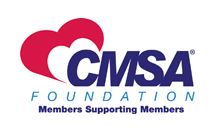
Thank you for your continued support of the CMSA Foundation, and for your generous donations at CMSA Annual in Las Vegas! Learn more about our most recent scholarship and grant recipients and meet one of the Foundation Board members on our latest enewsletter: click here. Don’t forget to follow up on Facebook here.
|
 CMSA and CCMC are working together to continue advancing professional case managers in their career paths. CMSA members receive a 20% discount when applying for the CCM, as well as upon renewal. Those who hold the CCM certification receive a 20% discount for CMSA membership. CMSA and CCMC are working together to continue advancing professional case managers in their career paths. CMSA members receive a 20% discount when applying for the CCM, as well as upon renewal. Those who hold the CCM certification receive a 20% discount for CMSA membership.
If you have questions about how to take advantage of your new member benefit, please contact CMSA Client Services at cmsa@cmsa.org or 501-225-2229.
|
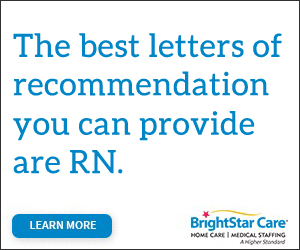
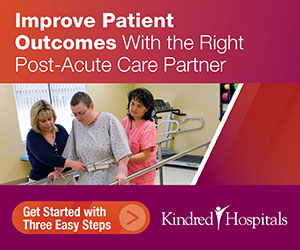
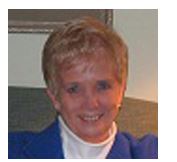 Pat Stricker, RN, M Ed, SVP, Clinical Services, TCS Healthcare Technologies
Last month’s article, Healthcare Data Breaches: Their Frequency, Impact, and Cost, discussed the overall impact that cybersecurity breeches are having on healthcare. Healthcare continues to lead all industries in the number of beaches with 27% and has the highest cost for data breaches at $408/record, nearly three times the cross-industry average of $148. While the number of data breaches in healthcare remained relatively the same between 2017 and 2018 (359 and 351), the number of healthcare records exposed increased at an alarming rate of over 250% (5,138,179 to 13,020,821). This shows that hackers are getting bolder. They realize each healthcare record is worth $50 on the black market, much more than Social Security and birth date records ($3) or credit card information ($1.50). That is because healthcare records contain personal, financial, and medical data that can be used for Medicare fraud – the most profitable type of identity theft.
Studies also show that healthcare employees are seven times more often responsible than employees of other industries for causing breaches due to human errors and/or careless actions such as: inappropriate conversations; misuse or careless handling of mail, emails, and other hard copy documents; leaving computer screens or hard copy records unattended and visible to others; and sharing passwords or not logging off a computer when not in use.
|
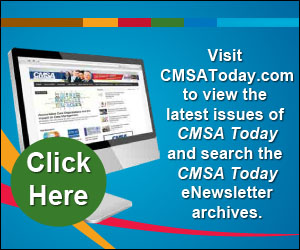
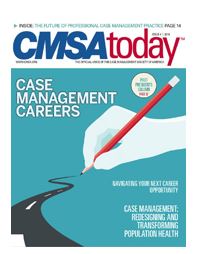
by Anne Llewellyn, MS, BHSA, RN-BA, CCM, CRRN
A career is defined as an occupation undertaken for a significant period of a person’s life and with opportunities for progress. When I became a case manager in 1988, I remember thinking how case management closed the circle of nursing for me.
Here’s what I mean:
As a nurse, I had worked in the emergency department (ED) and respiratory intensive care (RICU) at a major teaching hospital in Philadelphia most of my career. I loved the fast-paced nature of these units and the critical nature of the patients we cared for.
Throughout my nursing career, I worked with great nurses. We worked as a team and supported each other. We were trusted by the doctors (attending, fellows, residents, interns and students). We didn’t always know the cause, but when we called the doctor from the ED or the RICU, they came because they trusted us.
The patients were very sick. In the ED, we worked on patients who were shot or stabbed so they could go to the OR for a chance to live. We had overdoses and rapes. It was a tough place to work, but I loved it and was good at what I did.
|
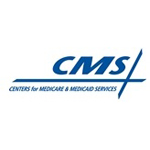
Proposed rule would implement key provision of the Substance Use Disorder Prevention that Promotes Opioid Recovery and Treatment (SUPPORT) for Patients and Communities Act
On June 17, the Centers for Medicare & Medicaid Services (CMS) issued a proposed rule that would improve patients’ access to needed medications by updating the prior authorization process for Medicare Part D, the program that provides coverage for prescription drugs that beneficiaries pick up at a pharmacy counter. The prior authorization process requires that providers supply additional clinical information to verify that the medication can be covered under the Medicare Part D benefit. The process promotes better clinical decision-making and helps ensure that patients receive medically necessary prescription drugs. The proposed rule would update the Part D e-prescribing program by adopting standards that ensure secure transmissions and expedite prior authorizations.
“Improving patients’ access to prescription drugs is a top priority for CMS,” said CMS Administrator Seema Verma. “This proposed rule would reduce the time it takes for a patient to receive needed medications and ease the prescriber burden by giving clinicians the flexibility and choice to complete prior authorization transactions electronically.”
Source: Centers for Medicare and Medicaid Services
|
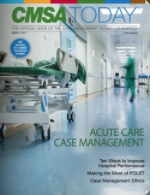 CMSA Today™—the official magazine of the Case Management Society of America—is the magazine for case managers. We are committed to providing case management knowledge, perspectives and news to case managers in all sectors of the profession. To facilitate that mission, we accept and consider: CMSA Today™—the official magazine of the Case Management Society of America—is the magazine for case managers. We are committed to providing case management knowledge, perspectives and news to case managers in all sectors of the profession. To facilitate that mission, we accept and consider:
- Original articles written by case managers of all healthcare backgrounds;
- Expertly prepared articles from professional writers—whether medical writers or experienced generalists—on case management topics;
- Feature articles, column material, and news about case management trends and issues, as well as about CMSA chapters and their activities;
- and personal, member-generated items considered nontraditional for a professional-association publication as poems, remembrances and similar sorts of content.
Consider sharing your knowledge by writing and submitting an article! Click below to learn more.
Learn More
|
 Building on the success of ibd.care and myms.care, PRIME, in partnership with the Case Management Society of America (CMSA) and the Academy of Managed Care Pharmacy (AMCP), are pleased to announce the launch of lipid.care, a new online-tethered tool to facilitate shared decision making and help guide critical conversations between patients receiving care for high cholesterol and the clinicians delivering it. Accessed from the same landing page and requiring no download, patient-focused CarePath and provider-focused CareNavigator help align preferences and goals, ensuring that patients and their providers are on the same page to help improve the patient experience and outcomes. These online tools are also designed to help simplify the process of navigating increasingly complex health insurance requirements for both patients and providers by offering specific tips to avoid unnecessary delays in treatment. In addition, patients can print a customized “CareGuide” to take with them to their medical appointments. The CareGuide, which includes a list of the patient’s preferences, key concerns, and questions, serves as an important resource and reference tool when patients are deciding on a care plan with their providers.
|
|
| |
|

